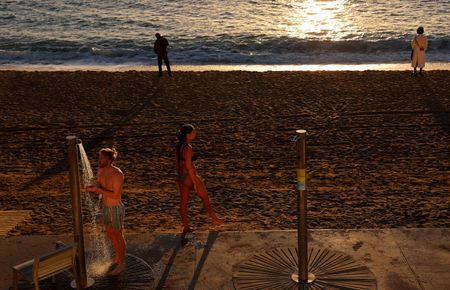BARCELONA/MADRID (Reuters) -Catalonia, Spain’s most popular region for visitors, has postponed a plan to charge a maximum 15-euro ($17) daily tourist tax starting in May while it looks for ways to curb overtourism.
The regional government said on Tuesday the increased tax, from the current six to 11 euros, will be implemented in October at the earliest. The government abandoned plans to introduce it by decree and decided to pass it through the regional parliament to avoid potential legal problems.
The plan is to use at least 25% of the tax revenue to ease a housing shortage, which is a prime complaint among residents as rents have soared in the past few years.
Spain expects to surpass last year’s record of 94 million tourist arrivals this year.
The tax range in force currently applies to hotel guests and cruise ship passengers, depending on how luxurious their accommodation is.
The tax-hike plan followed protests by residents about overtourism pushing up housing prices that in one instance involved protesters squirting visitors with water pistols.
Barcelona’s association of tourism apartments, Apartur, said it opposed the increase as it would make holidays more expensive, arguing parliament should only approve any increase gradually.
Tourist arrivals to Catalonia grew by 10% in the first two months of 2025 over last year, a slower pace than in Spain’s capital Madrid, which received 13% more tourists during the same period, according to official data. Madrid does not charge a tourist tax.
The data signals that Catalonia’s measures to reduce overtourism, including restricting licences for new hotels in central Barcelona, may be paying off. Still, Barcelona room rates rose by 10% in the 12 months through March, compared to Spain’s average of 3%.
The mayor of Barcelona announced last year a ban on apartment rentals to tourists by 2028, a move strongly criticised by platforms such as Airbnb who say it will not solve the housing crisis.
($1 = 0.8795 euros)
(Reporting by Corina Pons and Joan Faus, editing by Aislinn Laing, Andrei Khalip and Rod Nickel)









